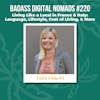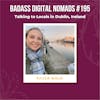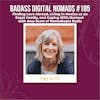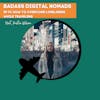What Kind of Expat or Nomad Are You?

What kind of expat or digital nomad are you? Find out what the four main types of expats or nomads are and the pros and cons of each. Plus, why you decide to be any of them (or none of them) at any time.
What kind of expat or digital nomad are you? Find out what the four main types of expats or nomads are and the pros and cons of each. Plus, why you decide to be any of them (or none of them) at any time.
Location independence is a mindset and a spectrum - you get to decide and design what your life of freedom looks like on your terms!
Free Resources:
Show Notes:
Related Podcasts:
- Your Perfect Day-in-the-Life as an Expat Abroad
- The Best Things About Living Abroad
- What is a Digital Nomad?
- How to Become a Digital Nomad (Expat Money Show)
- *Every Episode* about Living Abroad in an Expat Lifestyle
...........................................................................................
Connect with Kristin:
- Follow on Instagram
- Subscribe to Traveling with Kristin on YouTube
- Subscribe to Digital Nomad TV on YouTube
- Join the Badass Digital Nomads Facebook Group
...........................................................................................
Support the Badass Digital Nomads Podcast:
Thank you to Jeff Right for the 15 coffees this month!
- Buy Me a Coffee
- Become a Patron
- Leave a 5* Review: https://lovethepodcast.com/digitalnomad
- Buy Official Merch
- Search All Episodes: www.badassdigitalnomads.com
...........................................................................................
A special thank you to Kristin's Patrons: Walt, Shawn, Richard Y, Heather, Karen, Kiran, Scott, Michael J, Isaac, Mike M, Yasmine, Erick M, Yohji, Ron, Gary, Annie, Henry L, Keith, Stephen, Warren, James, Daniel, Gary B, Emily, Rich, Phil, Anthony, Jennifer, Kathleen, Natalie, Dave B, Brian, Christopher, CJ, David G, Mike R, Chip, Shelly, Ron, Paul, Andy, Jeffrey, Paulo, Stephen, Michelle, DJ, Mark D, Francis, and Dave M.
Special welcome to our newest Patrons from December 2021 and January 2022: Francis and Dave M. ❤️
Become a Patron for $5/month at Patreon.com/travelingwithkristin
...........................................................................................
Podcast descriptions may contain affiliate links of products and services we use and recommend at no additional cost to you.
Sneak Peek:
Kristin: 00:00:00 Traveling fast means you have a really limited window for all the different categories of life for your personal life, for friends, for family, for work, and especially for integrating with the local culture, which is one of the big reasons we like to travel to begin with.
Introduction: Welcome to Badass Digital Nomads, where we're pushing the boundaries of remote work and travel, all while staying grounded with a little bit of old school philosophy, self-development, and business advice from our guests.
Kristin Wilson, Host: 00:00:38 Hi friends, Kristin from Traveling with Kristin here and welcome to episode 142 of Badass Digital Nomads. And I have a question for you. What kind of expat are you? What kind of digital nomad are you? Because location independence is a spectrum. It's not a fixed identity. There's no one type of digital nomad or expat. You get to determine how much of a digital nomad or expat you want to be. You get to create your own identity of what location independence means for you, and that identity is flexible. It can change from month to month, from year to year and back and forth throughout the course of your life. So there's no one type of location, independent person that is unique to you as an individual. Your personality, your lifestyle, your goals, your wants, all of those things. But there are a few categories that you may relate to at different phases of your life.
Kristin: 00:01:56 So sometimes you might be a full-time nomad, while at other times you might be more of a settler or a permanent resident in another country. So in today's podcast, I'm going to cover the pros and cons of each type of expat or nomad in four main categories, from fully nomadic travelers to slow mads to long-term expats, to permanent expats. Learning about the different main categories of nomads and expats is a way for you to help define your lifestyle and create a frame of reference for the type of experience that you want to have at any given time or phase of your life. Knowing generally what type of category of expat you most relate to can also help you with planning your budget, deciding where to go first or where to go next, and even how long to book your housing for. And a lot of other logistical aspects of the relocation can be made easier by being able to identify what type of expat experience you are looking for.
Kristin: 00:03:17 The audio that you're about to hear in today's podcasts is one of the training videos in my private group coaching program Ready to Relocate. So this is lesson 1.3. This is the third lesson of section one out of eight sections of the course each, which focuses on a different aspect of the relocation. So there might be one entire section with seven or eight lessons on banking and finances. There's also an entire section on housing, so this is just one of the introductory lessons of the course. Ready to Relocate is my brand new three month guided program for moving step-by-step to a new country. It has lessons, tutorials, videos, resources downloads, a custom relocation roadmap, and a private members community with a series of live Q&A calls with me where you can ask me questions about any aspect of planning your relocation or what happens after you arrive in the weeks, months, and even years after you become an expat.
Kristin: 00:04:34 Enrollment in Ready to Relocate will reopen in February, and you can learn more by applying for a free call with me at travelingwithKristin.com/apply or by using the link and the show notes. But before we find out what kind of expat you are, I would just like to say thank you to everyone who has left a podcast review for Badass Digital Nomads. To date, we have received reviews from 83 listeners in 20 countries and I appreciate it so much. It's so exciting to read new reviews because it's really the only way to directly communicate with podcasters and with each review, I feel like I get to know each of you better as individuals, why you like the podcast, why you listen, what we have in common, and it's really fun to read what you have to say and it's also so motivating and inspiring for me, especially when I'm having a really busy week or a hard time and I'm not feeling super energetic or motivated to record new podcasts.
Kristin: 00:05:49 So reading your reviews really gives me that strength and motivation to keep going. In December one listener named Boulder Ski Warrior commented, Big fan here, have been listening to Kristin for about a year, started on YouTube, then found the podcast, keep sharing an inspiring, it's your gift. Thank you. So kind of you to say Boulder Ski Warrior and stick with me because I'll be back on YouTube very soon. And then just a week or so ago, one of my Ready to Relocate clients, Ben T Light from the US also left a review in Apple podcasts. And this one really, it actually made me get emotional. He said genuine. I really appreciate the quiet but consistently grounded approach Kristin takes to this topic of sustained travel, giving a realistic and well-rounded perspective based as much in thorough research as lived experience. There is no mania here, but rather the authenticity of a modest person actually embodying a dream which is shared by many and offering up her experience for our benefit.
Kristin: 00:07:07 Uh, I get it. Makes me wanna cry. Thank you so much, B, I sent you a PM in the course area, but your review means the world to me and thank you again so much. I also received reviews this month from Asal, Camila, Frost Warrior and Digital Nomad Pioneer Omar Mo. So I will share more of those reviews in the weeks to come. But exciting news that you can now leave a rating on Spotify, which is a new feature, and you can do that from within your Spotify app or by going to lovethepodcast.com/digitalnomad. So the difference with Spotify is you can just leave a rating and not a review, but at lovethepodcast.com/digitalnomad or at badassdigitalnomads.com/review. You can also leave a review and now you can leave reviews directly on the website at badassdigitalnomads.com. Fun stuff. But back to today's topic of figuring out what kind of expat are you.
Kristin: 00:08:17 In the next 10 or 15 minutes, I'll be breaking down the four main categories of expats and nomads from the slowest to the fastest travelers out there. I hope there's one here that fits with you. Enjoy.
Audio from Ready to Relocate starts:
Kristin: What type of expat are you? Let's find out what your relocation identity is. There are four main types of expats. First, you have your permanent expats. These are people who are on a long-term residency track in a country or on a path to permanent citizenship. Then you have your long-term expats. These are people that want to live in a place for typically up to one to two years. Next, you have your slow travelers or slow mads. These are people who want to stay in a country for 1, 2, 3, or even six months at a time. And finally, you have your jet setters or your full-time nomads. These are the nomadic nomads.
Kristin: 00:09:19 So these are people who want to travel to a new place, experience a new city or country at a fast pace. You might stay there for one day, one week, one month and kind of keep things moving along. Which of these lifestyles is right for you? Let's look at the pros and cons of each. The biggest pro of being a permanent expat or immigrant is stability and also cultural identity. You have a home base. You know where you live and you know where you're going to be living potentially for the rest of your life. This is great if you are on the verge of renouncing your citizenship, but you just rather acquire a second one instead. Another good thing about a permanent expat lifestyle is that you're never thinking about your next destination. So you don't have to waste a lot of time booking plane tickets or planning your travel logistics.
Kristin: 00:10:14 You can just really integrate with the local culture. You have plenty of time to learn the language and get into the rhythm and flow of day-to-day life. Over time, you'll probably start to actually feel like a part of that society. You might even be on a path to citizenship with voting rights. You start to build a local network and you just get into a flow of daily life. You have immigrated to a new country, you've adopted a new society as your own, and that's a beautiful thing because all of your logistics and basic needs are taken care of. This also gives you more time to work or work on creative or professional side projects. You can also get your cost of living down really low, almost to the level of actual locals natives to that country. The downside of being a permanent expat or immigrant, a settler so to speak, is that you are tied down typically by definition.
Kristin: 00:11:14 Being able to acquire permanent residency or citizenship in that country means that you will have had to invest in some way, maybe invest in purchasing another passport, maybe investing in real estate. And depending on where you go, this can have a high cost, sometimes even $10,000 or more in legal and processing fees, plus a six or seven figure in investing in that passport. You might also find yourself being locked into paying for social security or healthcare in that country for a certain number of years. What you might also find after going through such a significant expense in inquiring this residency or citizenship that you didn't really need to do that, that you could have lived on your passport or a less stringent visa for the same amount of time with almost as much flexibility. Becoming a permanent resident is good if you decide that there's a country that you definitely want to live in long term and you can't see yourself really leaving.
Kristin: 00:12:19 But there's always a risk that after a number of years you decide that you didn't like that country, but now you have a lot of sunk costs holding you back so you can go from being tied to your home country to tied to a new country. Um, maybe you don't want to leave because you've invested so much money there. Maybe you can't sell the real estate that you bought and you're unable to rent it out and cover your costs. Maybe you just don't have the funds to leave and you feel stuck there. You might even have to pay taxes in that country. The pro of being a long-term expat is that you can access a lower cost of living compared to your slow traveling slow mads or your nomadic jet setters. You have time to learn the language and the culture of a place. You get access to lower housing prices and you get a chance to establish a daily routine in your destination.
Kristin: 00:13:13 It's also a lot easier to just integrate with the culture overall when you're spending a few months there, you get to make some new friends and it's easier to get into a daily work routine and be more productive. Being a long-term expat allows you to have a home base, and then you'll have more time to take side trips and go sightsee and kind of achieve more of a work-life balance compared to traveling faster. It also takes away the uncertainty of wondering where you're going to go next. You have a home base. You know you're gonna be there for at least a year and you can just sit back, relax, enjoy your day-to-day life in your new country. You can save money on food, you can save money on housing, and typically you can have a healthier lifestyle because you have more time to cook at home rather than having to eat out on the run.
Kristin: 00:14:05 The downside of being a long-term expat is that you have less flexibility and you're probably going to have to apply for some sort of visa or short-term residency permit. This means more time, more expenses, and sometimes even having to show proof of income at a level that you might not be at. You also might have to pay taxes in that country, and this just means that you end up seeing less of the world. If you're staying in a country for one or two years at a time, you might only get to experience life in a handful of countries. Next up is slow travelers. Slow travelers seem like they have the best of both worlds. They get to see a lot of places in the world, but going at a more sustainable pace as a slow traveler, you have a pretty significant opportunity to get to know the day-to-day life in a culture and maybe even learn the language after spending a few months in a country.
Kristin: 00:15:03 You really start to feel comfortable there. You start to get to know it like the back of your hand. You can get around easier and you will have also started to build a local network of people, whether that's locals, expats, tourists. You get to make friends. It might be a little bit easier to date than if you're traveling faster and it gives you a chance to really get into a daily routine in that place. Having three months or six months in a country also allows you to take side trips to other countries or do a lot of sightseeing without compromising your work. Another perk of being a slow traveler or a slow mad is that you typically don't have to pay taxes in the countries that you're just passing through, and you're also not there long enough to really see the negatives of living in that country.
Kristin: 00:15:53 This is a way to stay in a perpetual honeymoon phase and really never get bored. The downside of being a slow mad though is that it can still get tiring. Moving to a new place, every one, two or three months can be pretty exhausting. Time goes by really fast, and when you've lived in one place for many years or even your whole life, it can be easy to discount the amount of energy that it takes to keep moving. Maybe you've moved from one house to another in your hometown and it wasn't a very fun experience for you. When you are traveling full time, even if you're just with a backpack or a suitcase or two, it still requires a lot of energy to move from one place to the other. You're also on the clock, aka a tourist visa. So from the time that you enter that country, the clock is ticking until you have to leave.
Kristin: 00:16:49 It might be 30 days, 90 days, or 180 days, but at some point you're going to have to either apply for an extension, leave the country for another three to six months or leave and come back in depending on what the restrictions are of that country. And if you go to, let's say, 12 countries in a year, one per month, you're going to spend the first few weeks or even the entire month in that country climbing the learning curve of that new place. So that can take away time, that could have been better spent just having fun, relaxing sightsee or being productive at work. It also means you need to change your internet and infrastructure plans. Your friendships can also suffer as soon as you make friends and start to bond with people. It's time to leave. Either you are leaving or they're leaving, and this can wear on you over time.
Kristin: 00:17:42 Slow travel can also be tricky depending on your work schedule. So depending on what time zone you have to work in or how many hours you work per week, if you're going to a lot of different destinations throughout the year, the quality of your work could suffer and your stress could go up. You might also start to feel guilty about not working when you're out sight seeing, or you might be stuck working when everyone is out having fun. And the fourth category is being a full-time nomad or jet setter. And the biggest pro of this lifestyle is that you get to see a lot of places in a really short amount of time. Maybe you haven't been able to do much traveling for your entire life, and you have a long list of places on your bucket list that you just want to see as fast as possible.
Kristin: 00:18:29 Being a jet setter or a full-time nomad is a good way to be able to hop around the world without having all of the expenses of a full-time home base. So you can reinvest the money that you would have spent on your housing, utilities, car payment, rent, payment, and put that into travel. As a nomad or jet setter, every day is an adventure. You surely will never get bored. You're gonna have a ton of fun, lots of experiences, meet amazing people, and basically feel like you're living in this honeymoon stage of travel all the time until you start to get worn out. So the biggest pro of being a jet setter is just being able to pinch yourself at all of the amazing experiences that you're able to have in the matter of just a few short months or years. But the downside of this is that eventually you're going to get really tired and start to feel ungrounded.
Kristin: 00:19:24 As an experienced nomad, I don't know anyone who has been able to travel at a fast pace for an extended period of time. Once you hit a certain point, whether that's three years for you, five years, seven years, 10 years, 12 years, eventually you're gonna burn out. Jet setting is exhausting even if you're flying in private jets. So the more that you're changing locations, the more time you have to allocate to planning the logistics of each move and the more time you spend traveling between point A and point B, you might end up spending 30% of your time in airports, train stations on buses, or just feeling jet lagged and exhausted. Traveling fast means you have a really limited window for all the different categories of life for your personal life, for friends, for family, for work, for having fun and sightseeing, for exercising, for eating healthy, and especially for integrating with the local culture, which is one of the big reasons we like to travel.
Kristin: 00:20:27 To begin with, it's almost impossible to learn the local language if you're only there for a few days a week or a month. And it's also really difficult to build a new business or to work on creative deep work projects when you're traveling from one place to another. Really fast jet setting is also expensive. The more you're changing locations, the more you're exposing yourself to extra unforeseen expenses. So it's really hard to stay within your budget. You'll end up paying a lot of your budget towards transportation. You'll also end up paying peak prices for short term housing and hotels, and you'll be eating out more than cooking at home. Jet setting is really fun for some amount of time, depending on your situation. But over time, you might start to crave more stability and groundedness. You might also start to realize that although it's important to have fun in life, there's also more to life than just having fun, like connecting at a deep level with other people or creating and contributing something more of value in the world.
Kristin: 00:21:34 So what do you think? What is your relocation identity? Write it down in your journal or let us know in the course comments below. Thanks so much for spending time with me today. What do you like about the podcast and what do you want to hear more about? Head over to lovethepodcast.com/digitalnomad to leave your feedback through any platform or in your favorite podcast app. You can also leave reviews now on badassdigitalnomads.com and comments as well. And if you'd like my help in planning your relocation in the upcoming year, then head over to travelingwithkristin.com/apply to register for a free call with me to discuss your relocation plans. You can also go straight to this link in the show notes. I hope you have a beautiful rest of your day and see you again next week.































































